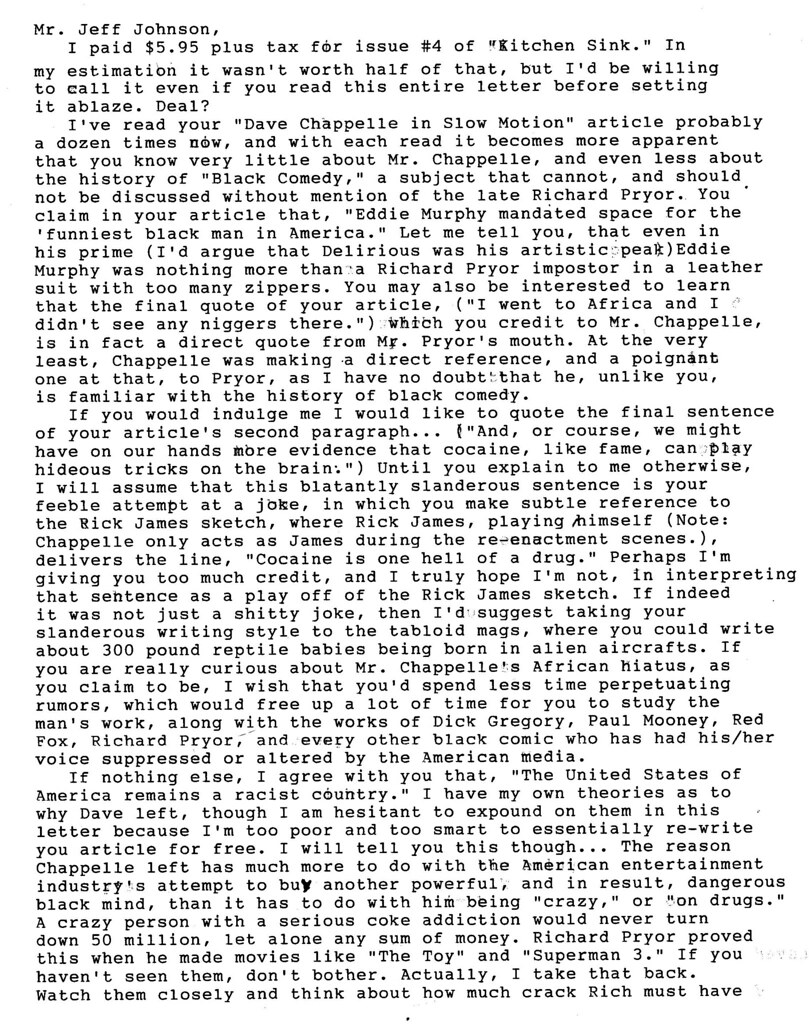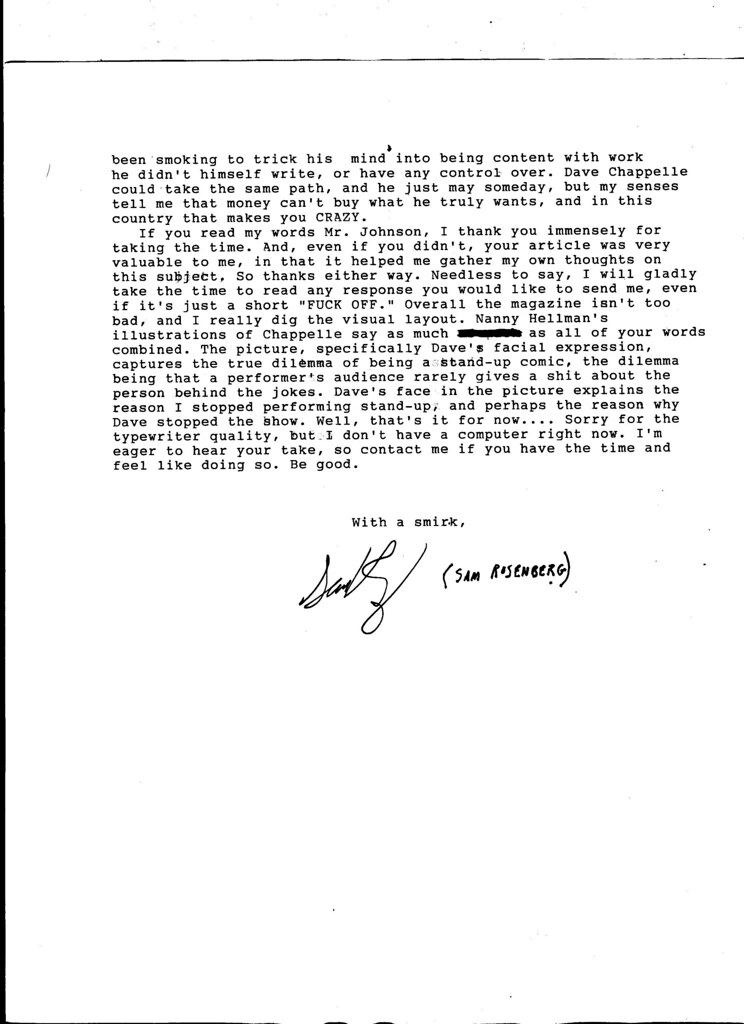letter to the editor: re: "dave chappelle in slow motion," ks12
POSTED BY RAYGONNE
ks readers may be surprised to hear that it is a rare occurrence that a somewhat lengthy, very much intelligible letter arrives in our mailbox. imagine our delight when we received the following single-spaced two-pager from sam 

sam
first, i want to thank you for your thoughtful letter. the fact that you read my essay more than once, and that it was valuable to you because it helped you gather your thoughts on a subject you obviously feel passionate about matters much more to me than whether you agree with me or like my prose style. at this moment i’m stuck between rereading my essay before continuing, and letting your words stay fresh in my mind, now that i’ve read your letter a few times and have various responses spinning around in my head.
i’m going to proceed directly from your letter, for now.
i agree with you that any consideration of “black comedy” must absolutely take serious consideration of richard pryor. furthermore, in many ways i think he would have been a better example than eddie murphy in my essay. at the time, i compared chappelle to murphy, or, more accurately, compared his career to murphy’s, because murphy was such a popular “cross-over” comedian. to my recollection, i was most interested in talking about chappelle as the most famous black comedian of the last few years, and i was convinced that he was the most famous black comedian since murphy, in terms of mainstream success, and its attending pressures and complications. i was especially interested in the extent to which he was entertaining a white audience that is hyper-aware of his blackness—which is not to disregard chappelle’s black audience. part of what makes me so fascinated with him is that he seems to be funny to black and white audiences, and that he criticizes black and white people. ultimately, it might not even make sense for me to talk about a black and white audience for chappelle, since he’s talking to everyone at the same time, even when he appears to be addressing black people or white people specifically (example: when he jokes about using the term “skeet” without being censored, because white people don’t know what it means, his humor is pretty complicated. he’s talking to people who know what skeet means, which i believe he says is black people, but he’s also talking to white people, because he knows they’re paying close attention and don’t want to miss the joke. he doesn’t define “skeet,” if i remember correctly, which suggests an in-joke, but he also runs around the stage gesturing while he says “skeet skeet skeet!” so you can pretty much figure out what it means if you’re paying attention. also, of course, he’s suggesting that the censors are white people who don’t know what skeet means, or possibly black people who think it’s funny that their white co-censors don’t know what it means. it’s a routine that very well demonstrates why chappelle is such a great comic, and i wish i talked about it in my story. however, part of what we do, for better and for worse, at ks, is try to say something substantial in a concise way, which means that a writer has to stay pretty focused in a story in order to keep it tight and comprehensible.).
another reason i thought the murphy reference was apt is that i could contrast the way the two of them dealt with massive amounts of riches and fame, and eddie murphy was close at hand because his brother charlie murphy is on chappelle’s show. that goes back to my point about making things concise; i could bring eddie into the discussion without necessarily getting in over my head by having to establish a more distant connection. i was fascinated by the fact that charlie murphy witnessed first hand the ascendancy of two phenomenally successful black comedians, and that for many people, chappelle is the heir to eddie murphy as a popular comedian, which makes his association with charlie murphy sound like a smart move on chappelle’s part. he had his own show, and he had someone around who knew what that level of fame and scrutiny could do to someone. (not that charlie murphy didn’t pull his weight in other ways; he’s funny as hell.) also, at this point it’s easy to contrast the careers of eddie murphy and dave chappelle, since they responded to the same dilemma in different ways. murphy succumbed to expectation by making toothless movies (after
i am a fan of richard pryor, and the more i hear of his standup (and after having seen jo jo dancer), the more knocked out i am by his humor and intelligence. i had him in mind when i wrote the chappelle story, and thinking about my essay, as well as pryor’s death, encouraged me to delve deeper into pryor’s work. i would have done well to make note of him in my story, and to acknowledge the lineage of black comedians that runs through pryor and murphy and chappelle. i did not make a decision not to talk about pryor, but i know that a meaningful discussion of his work was beyond the scope of my story. he deserves more than a sentence or two in an in-depth consideration of the history of black comedy, but that’s not the endeavor i was undertaking. i agree that pryor’s contribution to comedy, and to history, is more substantial and profound than that of eddie murphy, but that doesn’t make him a better example of dealing with the sort of fame dave chappelle has had to deal with.
thanks, by the way, for pointing out that chappelle’s line about
as for my sentence about how chappelle’s flight from the set might turn out to be cocaine-related, i think i didn’t come across to you the way i meant it to. i was acknowledging rumors of chappelle having a drug-induced breakdown, but i felt like i was basically dismissing that theory, even indicting it as a stereotype of black fame, in favor of a much more likely scenario, which i outlined: he was suddenly very rich and very famous, and life had gotten very complicated, and he didn’t know who he could trust, and he needed to go someplace where he felt like he could get his head on straight. i summarized this latter theory in the sentence before the one you quoted (which i’ve just gone back to read), and it was my intention to favor that theory over the more sensational, reactionary take regarding presumed drug use. that’s part of why i was so caught up on “his” comment that “i went to africa and i didn’t see any niggers there.” i thought he was anticipating his flight, saying that he could go to africa and just be a man, a person, and escape the constant and at times misguided and misinformed awareness of race in america.
in no way was it my intention to perpetuate the notion that drug use was the cause of chappelle’s departure from the show, though i wanted to acknowledge that it would be ironic if that were the case, since drug humor was such a big part of his show. it would be especially ironic—and now it occurs to me that i should have pointed this out—because the drug humor on chappelle’s show was always delivered at a remove, whether ironic, parodic and/or in character. he didn’t joke about doing drugs as much as he joked about other people doing drugs, and about the way white people associate drug addiction with black people. anyway, that’s why it would be sad and ironic if we were to learn that chappelle had a drug problem—he seems to know better than to go down that suspiciously sign-posted path. he understands that drug addiction causes one to lose control, and he’s obviously a) in control of himself and his show, and b) well-aware of the triumphs and mistakes of his predecessors, black and white. ultimately, i believe what chappelle himself has said every time he’s talked about leaving the show: he had too many people around that he couldn’t trust, and he didn’t think the new episodes were up to his own standards. when he talks about trust, he talks about people making demands of him, but he also talks about them not making demands of him. in other words, he had a lot of yes-men around, and he didn’t think it was good for his art. it’s an incredibly brave and principled act for him to walk away from that, and i’m rooting for that scenario. i’d be sort of heartbroken if we either found out that he’d really just had a breakdown, drug-induced or stress-related, or if it started to seem like most people just assume that to be the case. i’d much rather learn that he made a personal, creative decision, and that he did so because he believes in the value of socially engaged, intelligent comedy.
thanks again for your letter, and i hope you return to kitchen sink with the same intellectual fierceness you brought to my story.
sincerely,
jeff johnson
ps. i’d also like to agree with you about the effectiveness of danny hellman’s illustration. i should mention that the best ks illustrators’ read the story they’re illustrating before they get to work. hellman may well have better captured chappelle’s dilemma than i did, but reading your description of the sense you get from the illustration, i thought, that’s exactly what i was trying to say. even if you don’t think i did a good job of bringing that across, i hope you could tell what i was trying to do.

0 Comments:
Post a Comment
<< Home